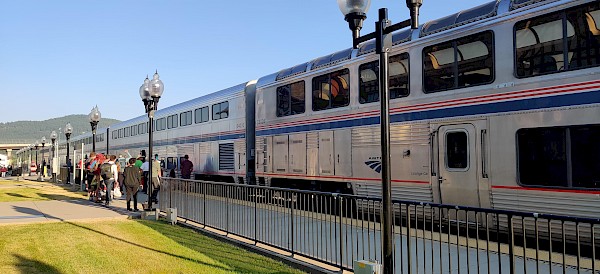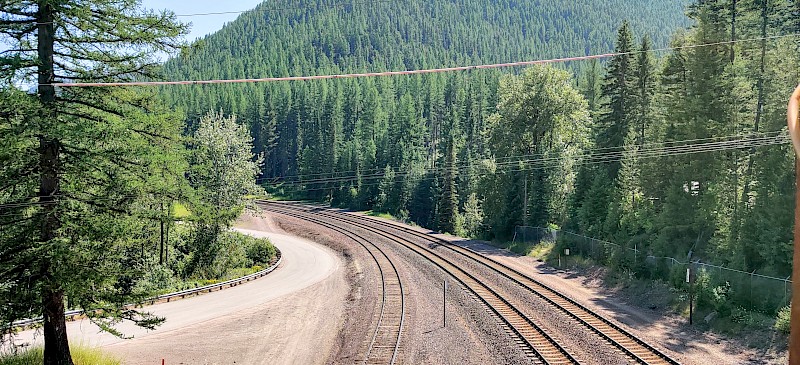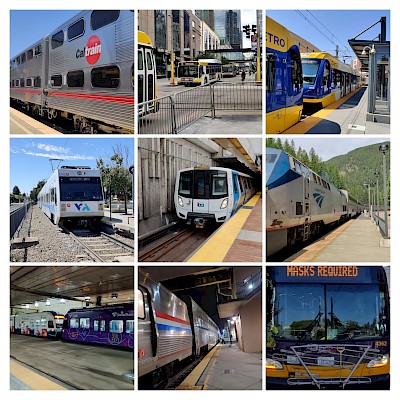Happening Now
Beyond the Builder
September 1, 2020
Musings on Responsibility, Recovery, & Ridership
By Madi Butler
When I began planning this excursion, I had to first weigh the risks of travel during a time like this for both my coordinator and myself. Ultimately after hearing reports that Amtrak had done everything they could to make sure their rolling stock was clean and safe, we decided to go on a multimodal exploration of a few major cities and the long distance network that connects them. At a time like this is it pertinent to document our experiences as passengers. We surely live in an era of change and as Association staff, we need to be prepared to show Congress what our members are experiencing and why we advocate on their behalf.
There are facets of the passenger experience we can not properly advocate for if we do not physically represent those for which we advocate. There is content and communications we can not manage from our home offices and attempting to do so would come across disingenuous. We want to be transparent and aggressive in our stance. We want to make sure we document our field research in ways that prepare our staff, members, and allies to advocate for improvements we all need. I hope that my experience is something you as a passenger can benefit from reading.
I believe in the future of public transit, I believe increased long distance frequencies keep small towns from becoming isolated and rundown. In many ways, passenger rail and rail infrastructure provide so much economic and cultural benefit it stuns me to see some in Congress fail to grasp that. Meanwhile they are propping up the ever worsening and degrading farce that is the modern airline industry with money taxpayers would see a direct benefit from if it were invested in our national network, bringing jobs and stability to our communities across the country.
With all things considered we found the decision to go into the field was already made for us.
Our goal was simple: To show our members that we are out here fighting for them, even in the midst of a pandemic.
While leadership is hard at work in Washington DC, we also must be advocating for the future of our interstate passenger rail. Amtrak's proposed 3x weekly limited service overlooks the small towns they serve and jeopardizes the prosperity of America's rail-friendly communities. Many towns have invested their future in these stations. Amtrak must provide for the prosperity of these places and their passengers. We have plans to fight this ill advised move and we need all our members' support to help make the passenger’s voice heard by Congress.
If Amtrak executives follow through with this inauspicious plan, places like the historic Izaak Walton Inn in Essex, MT would lose money - plain and simple. 428,503 passengers relied on the Empire Builder last year to get them to their destination. We’ve seen what happens when it’s decided for us that Limited service is what we get - our communities suffer and ridership suffers. Daily service throughout the year is the lifeblood for them and so many other small towns & family businesses across the country.

While boarding in Whitefish Montana, we met two couples - one pairhad been taking Amtrak long-distance since they were first married over 20 years ago. The other couple was taking their first trip of the year after hearing how much safer it was to be on board the train versus flying. As avid riders, they were shocked to hear that more than half of the national service would be gutted by a few out of touch higher ups. "No one has said a word about this to us" one of the husbands remarked. "They just took down the timetables in our little station, that's all the answer we got." This is the sort of experience we heard all across the route as we traversed this beautiful country. "Our tax money is supposed to fund our trains, not line the pockets of those damaging our network." one of the ladies chimed in as she gathered her bags and stepped on board. Clear examples that not only are we still riding safely thanks to on-board cleanliness and new standards, more people want to get back on board and these cuts are nothing short of sabotage.
Moving to tri-weekly service could mean disaster for industries that rely on the train rolling through each and every day. Look at what has happened over the years to the current tri-weekly routes and then ask yourself “do we want the entire network to be treated like an afterthought?” We have spent 50 years developing America’s national interstate rail network and the short-sighted call of a few east coast executives can not be allowed to jeopardize everything we have built together. Amtrak is for all of us and it’s time for that fundamental truth to be taken seriously.
Asking for clean, safe, efficient service at a time like this is not unreasonable. Those elected to positions of power understand that refusal to fund these services in future stimulus bills is a slow violence against the people they were elected to serve. If they won't go look their constituents in the face and hear their concerns, we will take those concerns to the halls of Congress and make sure they listen. Same goes for Amtrak, thousands of passengers have signed petitions, written their Congresspeople, called into customer service, blogged, logged, tweeted, and emailed their absolute discontent in the elimination of daily service. We expect transparency on exactly when daily service will be restored and we will continue to push for the restoration and reconnection of the many towns the higher-ups continue to neglect.
Ultimately I would say our biggest takeaway was that it is abundantly clear providers who have prioritized staying clean, protected, and running frequently will be in the best position to get past what is happening currently if they stay funded. There must be continued funding to support the survival of the national network and regional transit solutions as well. While some people may have other means of transportation or the luxury of driving themselves, that does not protect the millions of us who do not. Cutting back service to less than daily on the national network and less than hourly on commuter lines is severing lifelines for those who rely on public transportation. We all must work together to assure that when we are living post-covid, we are still connected. Holding our ground as advocates will be essential in outlasting the myriad of outside interests that we always work against.
Having traveled between the Bay Area, Seattle, Whitefish, Essex, and Minneapolis using 15 different transit options and no car -- relying on masks, distancing, hygiene, and good practices did indeed keep me safe while traveling. I would not say this means everyone should travel. I truly do appreciate the immense privilege that comes with minimal physical limitation or immunocompromisation at a time like this. I hope to be able to use those strengths to advocate on behalf of those who may not be able to represent themselves directly and that I do so with the interest of all our passengers in mind. It truly takes a strong vocal grassroots network to protect and improve our rails and I am thankful to have had the opportunity to represent such a strong community.
"The support from the Rail Passengers Association, and from all of you individually, has been incredibly important to Amtrak throughout our history and especially so during the last trying year."
Bill Flynn, Amtrak CEO
April 19, 2021, speaking to attendees at the Rail Passengers Virtual Spring Advocacy Conference


Comments